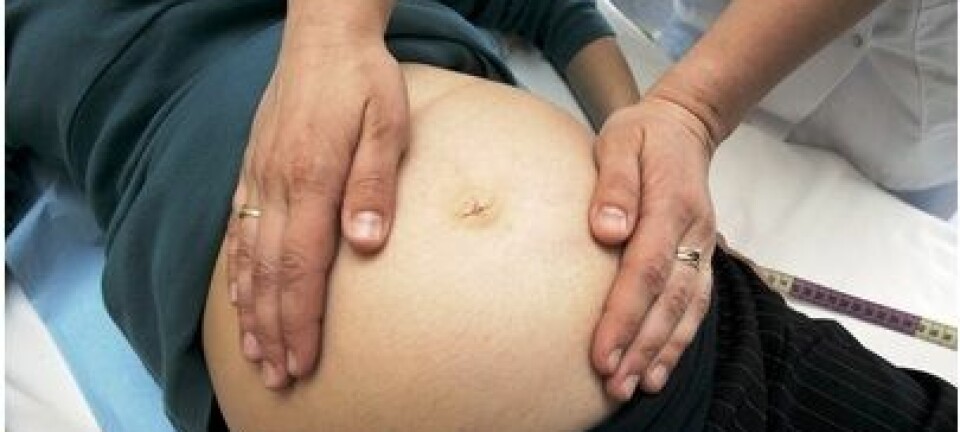
Birth control pills halve size of women’s ovaries
Birth control pills can reduce women’s ovaries upward 50 per cent in size. However, it’s not dangerous, says lead scientist.
If you take birth control pills you could be risking that your ovaries will shrink.
A study from Copenhagen University Hospital and Rigshospitalet shows that the ovaries are about 47 per cent smaller in women on the pill compared to women who don’t take the contraceptive.
"That the size of the ovaries is reduced so much is quite convincing," says lead author Kathrine Birch Petersen, fertility doctor and researcher at Rigshospitalet and Copenhagen University Hospital. "If we look at young women, between 19 and 29.9 years, their ovaries are reduced by 52 per cent compared with women who are not on the pill."
She stresses that the phenomenon is not dangerous and that the ovaries appear to return to normal size in the months after the woman stops taking the pill.
Young ovaries 'look old'
The new study included 833 women who visited a fertility advisory clinic at Rigshospitalet. The scientists' inspiration for the study arose because they were surprised that a number of young women visiting the clinic 'looked old' as far as fertility was concerned.
"Young women typically have well-developed and well-functioning ovaries, while women approaching their menopause have smaller ovaries with reduced egg production," says Petersen.
"We noticed that a number of young women who took birth control pills had ovaries that looked like they were approaching the menopause," she says.
The pill distorts fertility tests
Petersen points out that the new research also shows that birth control pills can make it difficult for doctors to determine how fertile a woman is.
The results of two known tests for women's fertility can be distorted if the woman tested is on the pill, she says. "It is not dangerous for women to take the pills, but if their fertility is being tested it is important to know that the pills can affect the results.”
"The test results tend to indicate that the women is older and has fewer eggs than she may have in reality,” says Petersen.
How women's fertility is tested
While men can produce sperm throughout their life, women are born with a certain number of eggs that is gradually reduced as the woman ages.
A woman's remaining number of eggs is often called her 'ovarian reserve', which can be looked at as an expression of how fertile she is.
However, doctors cannot measure the precise number of eggs that a woman has directly. Instead, they use two special markers to indicate how her ovaries are ageing, says Petersen.
The two markers are:
-
AMH test: The level of anti-Mullerian hormone (AMH) in a woman's blood can be measured in a blood sample. Small cells surrounding the eggs in the ovaries form AMH. Generally, the more eggs a woman has, the higher the AMH level in her blood.
- AFC test: Through ultrasound scanning of the woman's abdomen her antral (early stage) follicles can be counted. These follicles contain immature eggs that are released each month during menstruation. The measurement indicates how many eggs from the ovaries are recruited for ovulation -- and is thus an indication of how fertile the woman is.
Birth control pills give less reliable fertility test results
According to Petersen, a combination of these two marker tests is the best way of determining how large a woman's ovarian reserve is -- and thus how fertile she is.
But the new study shows that it is not certain that the results of the tests are correct if the woman is on the pill.
The study indicates that the result of the AMH test is 19 per cent lower on average for women who take birth control pills, while the result of the AFC test is reduced by 16 per cent on average compared with women who do not take birth control pills.
"This has most significance in connection with advising women who take birth control pills," says Petersen. "It means we must be aware that their ovarian reserve appears to be smaller if they are on the pill. That's because these pills work and suppress the normal hormonal system."
She emphasises that the new study does take into account factors such as age, obesity, smoking and so on that can affect women's ovarian reserve. In fact, the results were much more significant when the researchers focused exclusively on the youngest women in the study, adds Petersen.
Study generates foreign attention
It is uncertain precisely how long the size of a woman's ovaries and these test results are affected by her birth control pills, but Petersen says that the effects appear to be temporary and will presumably disappear in the course of three to six months after the woman stops taking the pill.
"If a woman has a lower ovarian reserve than expected for her age we would recommend that she stops taking the pill and gets retested after three months," says Petersen.
The new Danish research results have not yet been published in a scientific journal, but Petersen presented them at the European Society of Human Reproduction and Embryology fertility conference (ESHRE conference) held in Munich at the start of July.
Here the results attracted attention and a number of foreign media have reported on the Danish study.
Scientist: no cause for panic
Dr Lubna Pal, who heads the menopause and polycystic ovarian syndrome research programmes at Yale University in Connecticut, USA, told the news site LiveScience.com that "Women should not be freaking out that they are losing their eggs" if they're taking birth control.
"These [AMH and AFC] tests are yardsticks that should be applied only in the context of fertility assessments," Pal told LiveScience.
Pal emphasises that the results of the Danish research make sense from a biological perspective, as the aim of birth control pills is precisely "to suppress the ovarian function".
Like Petersen, Pal says that the new study should not cause women to fear that they’ll have poorer egg quality or lose the ability to become pregnant because they take birth control pills.
Older women become less fertile -- also when they take the pill
Women should, however, be aware that they lose the ability to get pregnant, as they grow older, says Petersen.
"Today, women are older and older before they start to think of having children, and getting pregnant can be problematic for them," says Petersen. "Many women believe that they 'save' their eggs when they take the pill, because they don't have ovulation. But that's not true. Eggs perish every month even when you're on the pill."
As well as birth control pills, the new research results also apply to vaginal rings, but not to contraceptive mini-pills, hormone spirals and contraceptive implants.
-----------
Read the original article in Danish on Videnskab.dk
Translated by: Michael de Laine







